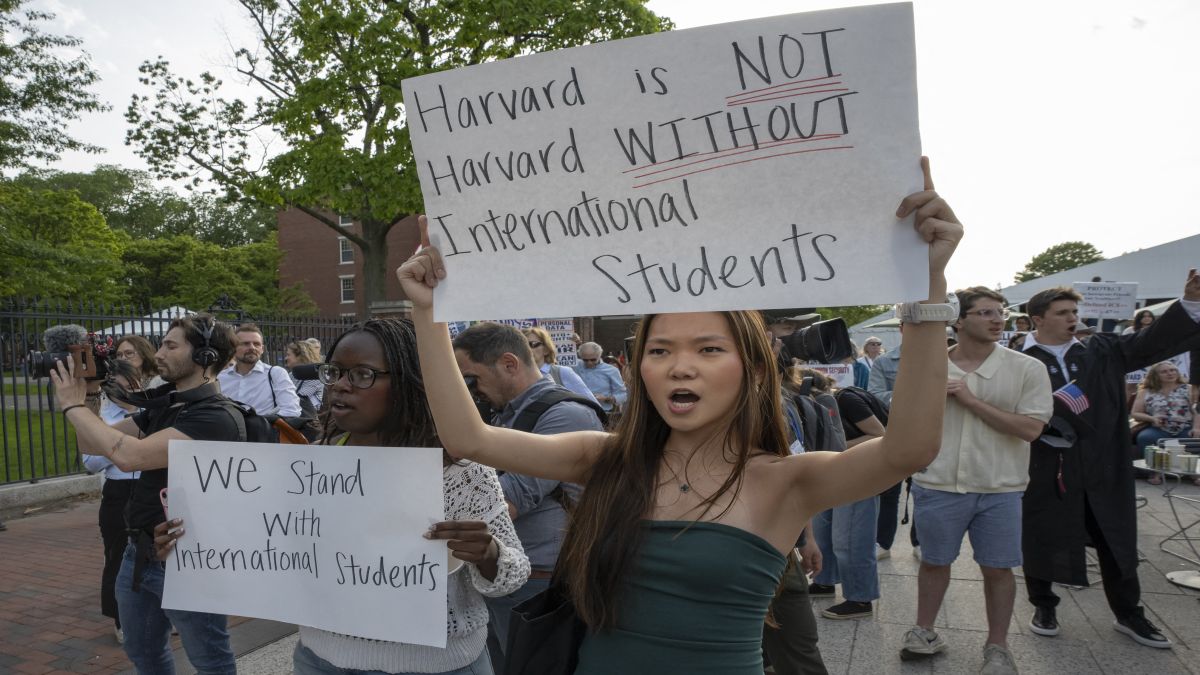If you have been thinking of going to the United States in your pursuit of a better education, the Trump administration has just become a huge hindrance to that dream. On Tuesday (May 27), the US State Department sent a cable to all its embassies and consulates in which it stated to pause interviews for foreign students applying for student and exchange visas.
It further added that the US is preparing to implement comprehensive social media screening for all international applicants. “The department is conducting a review of existing operations and processes for screening and vetting of student and exchange visitor visa applicants,” the cable reads. Officials plan to issue guidance on “expanded social media vetting for all such applicants”.
This is the latest escalation in the Trump administration’s battle against US universities — earlier, the administration blocked Harvard University from enrolling any new foreign students.
This new move has led to panic and concern among international students. However, many educators and analysts also fear the implications of blocking foreign students from studying in the US. They note that if these global scholars stay home, it’s bad economic news for cities and towns across the United States.
Here’s how.
Trump’s latest crackdown on foreign students
On Tuesday, US Secretary of State Marco Rubio ordered a suspension of student visa processing , the latest swipe at foreign students in the country.
A cable signed by Rubio orders embassies and consulates not to allow “any additional student or exchange visa… appointment capacity until further guidance is issued.”
The government also plans to ramp up vetting of the social media profiles of international applicants to US universities, the cable said.
Many fear that an extended pause in scheduling student visas could lead to delays that may disrupt college, boarding school or exchange students’ plans to enrol in summer and fall terms.
This comes after the Trump administration revoked Harvard University’s ability to enrol international students, removing the college from the programme that allows schools to sponsor foreign students for visas. That effort was quickly challenged in court and for now, is blocked by a federal judge.
The administration has already revoked the legal status of thousands of international students in the country, leading some to leave the US out of fear of deportation . After many students filed successful legal challenges, the administration said it was restoring the students’ legal status. But the government also expanded the grounds for terminating international students’ legal status going forward.
US universities at risk
While Trump and his supporters may tout this as a huge win, the reality is that blocking foreign students hurts US universities more than anyone else. In the 2023-2024 academic year, US universities — ranging from Harvard, Columbia, Boston and many more — enrolled more than 1.1 million international students.
In fact, a recent report released by the Department of State’s Bureau of Educational and Cultural Affairs and the Institute of International Education revealed that New York University, Northeastern University, and Columbia University are the three largest host schools for international students. At NYU, their enrolment has increased nearly 250 per cent over the last decade.
The report also revealed that India sent the most international students to the US for higher education with more than 331,000 students enrolled, according to the 2023-2024 data from Open Doors. China followed with more than 277,000 students, including nearly 123,000 graduate students, studying in the US.
Now, imagine if these students weren’t allowed to enrol. This would hurt the universities the most as foreign students are more likely to pay full tuition fees. As educational consultant Chuck Ambrose, former president of the University of Central Missouri, was quoted as telling Reuters, “They essentially subsidise other students who receive aid.”
For instance, at Harvard, the fee for the 2025-2026 year is $59,320 (Rs 51 lakh). This goes up to nearly $87,000 (Rs 74.8 lakh) when boarding and lodging are added. International students tend to pay larger shares of education costs compared with other students. Now, if Trump went ahead with his plan, these foreign students would be cut from admissions, impacting the overall economic conditions of the institutions. A 2015 study found that while foreign scholars made up 4.6 per cent of students, they contributed 28 per cent of tuition revenue.
A $44 billion economic impact
But cutting foreign students from US universities isn’t only going to hurt the institutions; it will have an impact on the American economy. Data reveals that these foreign students throw almost $44 billion into the US economy — through tuition, books, housing and even food.
NAFSA: Association of International Educators also revealed that these foreign students supported more than 3,78,000 jobs. Data shows that on average, a new job is created for every three international students enrolled in a US college or university.
In the 2023-24 academic year, about 3,78,175 jobs were created. And that’s just counting jobs that are directly supported by international students, such as local businesses hiring to staff retail shops and restaurants. If you count those jobs indirectly supported by international students, such as employees at a distribution centre, the number is even higher.
Impact beyond the economics
But beyond the economic contributions, losing international students will only hurt the US’ reputation globally. Fanta Aw, executive director and CEO of the Association of International Educators, or NAFSA, said, “We turn global talent away at our own expense. Losing international students’ contributions will negatively impact domestic students’ understanding of the world and have dire consequences for the country’s economic strength, security, and global competitiveness.
“These outcomes run counter to the administration’s stated goal of making America safer, stronger, and more prosperous.”
Other experts also note that a crackdown on foreign students only hurts US’ soft power. After all, American education has been one of its most potent soft-power tools for decades. As written in the Deerfield Scroll, “International students come, experience American values and democracy firsthand, and leave with an appreciation for its ideals. They return to their home countries almost as unofficial ambassadors, helping to spread those values abroad.”
Foreign students also help the US with a better worldwide view. As Scott Weinhold, with the Department of State Bureau of Educational and Cultural Affairs, was quoted as saying, “The experience of studying in the United States not only shapes the lives of individuals, but the future of our interconnected world. The ties formed between US and international students today are the basis of relationships for future business and trade, science and innovation, and government relations.”
Even Larry Summers, the former Harvard University president, concurred on this. “Closing yourself off from any group, and especially the 97 per cent of the world’s population that lives outside the United States is a prescription for failure. Damaged universities mean less prosperity and fewer new ideas, ranging from the golf tee to Sesame Street to transplantation to stem cell cures for diabetes to so many more things that came from Harvard research. No small part of that contribution came from foreign scholars. All of that is at risk with these actions.”
The future is uncertain but small ripples can already be noticed. International students are already growing cold towards the US, eyeing education in Europe and in parts of Asia. Will the Trump administration pay heed and course correct? Only time can tell.
With inputs from agencies


)

)
)
)
)
)
)
)
)



